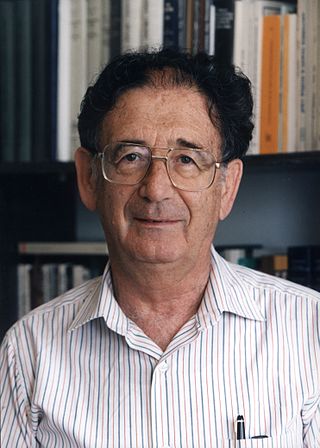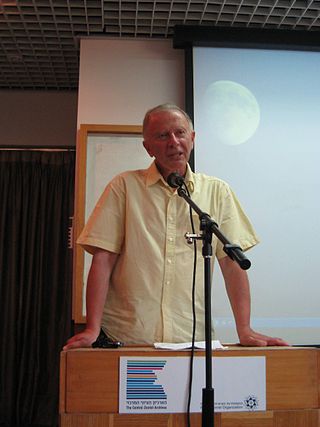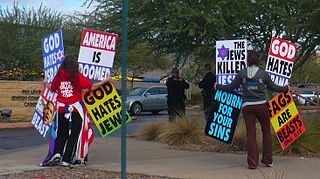Related Research Articles
Antisemitism is hostility to, prejudice towards, or discrimination against Jews. This sentiment is a form of racism, and a person who harbours it is called an antisemite. Though antisemitism is overwhelmingly perpetrated by non-Jews, it may occasionally be perpetrated by Jews in a phenomenon known as auto-antisemitism. Primarily, antisemitic tendencies may be motivated by negative sentiment towards Jews as a people or by negative sentiment towards Jews with regard to Judaism. In the former case, usually presented as racial antisemitism, a person's hostility is driven by the belief that Jews constitute a distinct race with inherent traits or characteristics that are repulsive or inferior to the preferred traits or characteristics within that person's society. In the latter case, known as religious antisemitism, a person's hostility is driven by their religion's perception of Jews and Judaism, typically encompassing doctrines of supersession that expect or demand Jews to turn away from Judaism and submit to the religion presenting itself as Judaism's successor faith—this is a common theme within the other Abrahamic religions. The development of racial and religious antisemitism has historically been encouraged by anti-Judaism, though the concept itself is distinct from antisemitism.

Philosemitism is a notable interest in, respect for, and appreciation of the Jewish people, their history, and the influence of Judaism, particularly on the part of a non-Jew. In the aftermath of World War II, the phenomenon of philosemitism saw a great increase throughout Europe following the Holocaust, reshaping the relationship between Jews and European societies. American historian G. Daniel Cohen states that philosemitism "can indeed easily recycle antisemitic themes, recreate Jewish otherness, or strategically compensate for Holocaust guilt".
Numerus clausus is one of many methods used to limit the number of students who may study at a university. In many cases, the goal of the numerus clausus is simply to limit the number of students to the maximum feasible in some particularly sought-after areas of studies with an intent to keep a constant supply of qualified workforce and thus limit competition. In historical terms however, in some countries, numerus clausus policies were religious or racial quotas, both in intent and function.
New antisemitism is the concept that a new form of antisemitism which developed in the late 20th and early 21st centuries, tends to manifest itself as anti-Zionism and criticism of the Israeli government. The concept is included in some definitions of antisemitism, such as the working definition of antisemitism and the 3D test of antisemitism. The concept dates to the early 1970s, although the identification of anti-Zionism with antisemitism has "long been de rigueur in Jewish communal and broader pro-Israel circles".

Yehuda Bauer is a Czech-born Israeli historian and scholar of the Holocaust. He is a professor of Holocaust Studies at the Avraham Harman Institute of Contemporary Jewry at the Hebrew University of Jerusalem.
The Stephen Roth Institute for the Study of Contemporary Antisemitism and Racism is a research institute at Tel Aviv University in Israel.
Charles Asher Small is a Canadian intellectual, the founder and director of the Institute for the Study of Global Antisemitism and Policy the first international interdisciplinary research center dedicated to studying antisemitism with a contemporary focus.

Racial antisemitism is prejudice against Jews based on a belief or assertion that Jews constitute a distinct race that has inherent traits or characteristics that appear in some way abhorrent or inherently inferior or otherwise different from the traits or characteristics of the rest of a society. The abhorrence may find expression in the form of discrimination, stereotypes or caricatures. Racial antisemitism may present Jews, as a group, as a threat in some way to the values or safety of a society. Racial antisemitism can seem deeper-rooted than religious antisemitism, because for religious antisemites conversion of Jews remains an option and once converted the "Jew" is gone. In the context of racial antisemitism Jews cannot get rid of their Jewishness.

Robert Solomon Wistrich was a scholar of antisemitism, considered one of the world's foremost authorities on antisemitism.
Kenneth S. Stern is an American attorney and an author. He is the director of the Bard Center for the Study of Hate, a program of the Human Rights Project at Bard College. From 2014 to 2018 he was the executive director of the Justus & Karin Rosenberg Foundation. From 1989 to 2014 he was the director of antisemitism, hate studies and extremism for the American Jewish Committee. In 2000, Stern was a special advisor to the defense in the David Irving v. Penguin Books and Deborah Lipstadt trial. His 2020 book, The Conflict Over the Conflict: The Israel/Palestine Campus Debate, examines attempts of partisans of each side to censor the other, and the resulting damage to the academy.
Antisemitism —prejudice, hatred of, or discrimination against Jews— has experienced a long history of expression since the days of ancient civilizations, with most of it having originated in the Christian and pre-Christian civilizations of Europe.

Antisemitism has long existed in the United States. Most Jewish community relations agencies in the United States draw distinctions between antisemitism, which is measured in terms of attitudes and behaviors, and the security and status of American Jews, which are both measured by the occurrence of specific incidents. FBI data shows that in every year since 1991, Jews were the most frequent victims of religiously motivated hate crimes, according to a report which was published by the Anti-Defamation League in 2019. Evidence suggests that the true number of hate crimes against Jews is underreported, as is the case for many other targeted groups. In an attempt to combat anti-Semitism, the Biden administration launched the United States’ first-ever comprehensive U.S. National Strategy to Counter Antisemitism on May 25, 2023.
Antony Lerman is a British writer who specialises in the study of antisemitism, the Israeli–Palestinian conflict, multiculturalism, and the place of religion in society. From 2006 to early 2009, he was Director of the Institute for Jewish Policy Research, a think tank on issues affecting Jewish communities in Europe. From December 1999 to 2006, he was Chief Executive of the Hanadiv Charitable Foundation, renamed the Rothschild Foundation Europe in 2007. He is a founding member of the Jewish Forum for Justice and Human Rights, and a former editor of Patterns of Prejudice, a quarterly academic journal focusing on the sociology of race and ethnicity.
The Yale Initiative for the Interdisciplinary Study of Antisemitism (YIISA) was an academic center at Yale University. Founded in 2006, it was the first university-based center in North America dedicated to the study of antisemitism. Professor Charles A. Small was YIISA's inaugural director.
The Institute for the Study of Global Antisemitism and Policy (ISGAP) is an American non-profit organization that produces academic research, seminars, and conferences to study antisemitism.
Antisemitism in France has become heightened since the late 20th century and into the 21st century. In the early 21st century, most Jews in France, like most Muslims in France, are of North African origin. France has the largest population of Jews in the diaspora after the United States—an estimated 500,000–600,000 persons. Paris has the highest population, followed by Marseilles, which has 70,000 Jews. Expressions of antisemitism were seen to rise during the Six-Day War of 1967 and the French anti-Zionist campaign of the 1970s and 1980s. Following the electoral successes achieved by the extreme right-wing National Front and an increasing denial of the Holocaust among some persons in the 1990s, surveys showed an increase in stereotypical antisemitic beliefs among the general French population.
Jonathan Judaken was the Spence L. Wilson Chair in Humanities at Rhodes College. Judaken previously taught at the University of Memphis where he was the Dunavant Professor of History and Director of the Marcus Orr Center for the Humanities. His fields of expertise include European cultural and intellectual history, discussions of Jews and Judaism, race and racism, and post-Holocaust French philosophy. Judaken is a notable scholar of Jean-Paul Sartre and Sartre's relationship to Jews and Judaism and race and racism, as well as contemporary French Jewish philosophers.

The Louis D. Brandeis Center for Human Rights Under Law (LDB) is a 501(c)(3) nonprofit organization founded by Kenneth L. Marcus in 2012 to advance the civil and human rights of the Jewish people and promote justice for all. LDB is active on American campuses, where it, according to the organization, combats antisemitism and anti-Zionism.
Maurice Samuels is the Betty Jane Anlyan Professor of French at Yale University. He graduated with a BA in 1990 from Harvard University, where he also earned his MA (1995) and PhD (2000). Before moving to Yale in 2006, Samuels taught at the University of Pennsylvania. He specializes in the literature and culture of nineteenth-century France and in Jewish Studies, and is the author of books and articles on these and other topics. He is the inaugural director of the Yale Program for the Study of Antisemitism.
The working definition of antisemitism, also called the International Holocaust Remembrance Alliance definition of antisemitism or IHRA definition, is a non-legally binding statement on what antisemitism is, that reads: "Antisemitism is a certain perception of Jews, which may be expressed as hatred toward Jews. Rhetorical and physical manifestations of antisemitism are directed toward Jewish or non-Jewish individuals and/or their property, toward Jewish community institutions and religious facilities." Accompanying the working definition, but of disputed status, are 11 illustrative examples whose purpose is described as guiding the IHRA in its work, seven of which relate to criticism of the Israeli government. As such, pro-Israeli organizations have been advocates for the worldwide legal adoption of the definition.
References
- ↑ Jeffrey Herf Salovey (5 June 2011). "Why Did Yale Close, Then Open, A Center for Studying Anti-Semitism?". New Republic. Retrieved 12 April 2016.
- ↑ Carole Bass (July 2016). "Anti-Semitism Research Center is Closed". Yale Alumni Magazine. Retrieved 12 April 2016.
- ↑ Deborah Lipstadt (5 June 2011). "How to Study Antisemitism". Forward. Retrieved 12 April 2016.
- ↑ Eli Markham (21 June 2011). "Yale Announces Yale Program for the Study of Antisemitism". Yale Daily News. Retrieved 12 April 2016.
- ↑ Ben Kline (28 October 2011). "Working Definition" . Retrieved 12 April 2016.
- ↑ YPSA (31 August 2011). "Conference on Antisemitism in France: Past, Present, Future" . Retrieved 12 April 2016.
